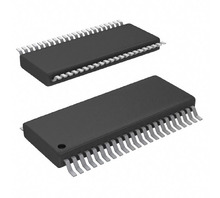Manufacturer Part Number
BQ20Z95DBTR
Manufacturer
texas-instruments
Introduction
The BQ20Z95DBTR is a component in the Power Management (PMIC) Battery Management category, created by Texas Instruments. This microcontroller is part of the Impedance Track™ series, which is known for its multi-function battery management capabilities specifically designed for Lithium Ion/Polymer batteries.
Product Features and Performance
Utilizes the Impedance Track™ algorithm
Manages 2 to 4 Lithium Ion or Polymer cells
Multi-function controller with SMBus interface
Provides over current, over temperature, over/under voltage, and short circuit protection
Operating temperature range from -40°C to 85°C
Product Advantages
Ensures superior battery performance and longevity
Comprehensive protection features enhance battery safety
Impedance Track™ technology helps accurately predict battery capacity and health
Supports a wide range of Lithium battery configurations
Key Technical Parameters
Battery Chemistry: Lithium Ion/Polymer
Number of Cells: 2 ~ 4
Fault Protection: Over Current, Over Temperature, Over/Under Voltage, Short Circuit
Interface: SMBus
Operating Temperature: -40°C ~ 85°C
Mounting Type: Surface Mount
Package / Case: 44-TFSOP (0.173", 4.40mm Width)
Quality and Safety Features
Implements multiple fault protection mechanisms to ensure the safety and reliability of battery operations
Compatibility
Compatible with a broad spectrum of Lithium Ion and Polymer battery configurations
Application Areas
Portable electronics
Battery-powered devices
Energy storage systems
Electric vehicles
Product Lifecycle
Obsolete status, suggesting the need for identifying replacements or upgrades
It's crucial to explore current offerings from Texas Instruments or alternative manufacturers for continuing support
Several Key Reasons to Choose This Product
Impedance Track™ technology offers advanced battery health and capacity monitoring
Comprehensive protection features ensure device and user safety
Wide operating temperature range is suitable for various deployment environments
Compatible with multiple Lithium battery types, allowing flexibility in design
Despite its obsolete status, its advanced features might still make it the best choice for specific legacy applications or systems where replacements are carefully managed



 BQ21040DBVTTexas InstrumentsIC BATT CHG LI-ION 1CELL SOT23-6
BQ21040DBVTTexas InstrumentsIC BATT CHG LI-ION 1CELL SOT23-6 BQ21061YFPRTexas InstrumentsIC BATT CHG LI-ION 1CELL 20DSBGA
BQ21061YFPRTexas InstrumentsIC BATT CHG LI-ION 1CELL 20DSBGA BQ21080YBGR
BQ21080YBGR BQ20Z95EVM-001Texas InstrumentsEVAL MODULE FOR BQ20Z95-001
BQ20Z95EVM-001Texas InstrumentsEVAL MODULE FOR BQ20Z95-001